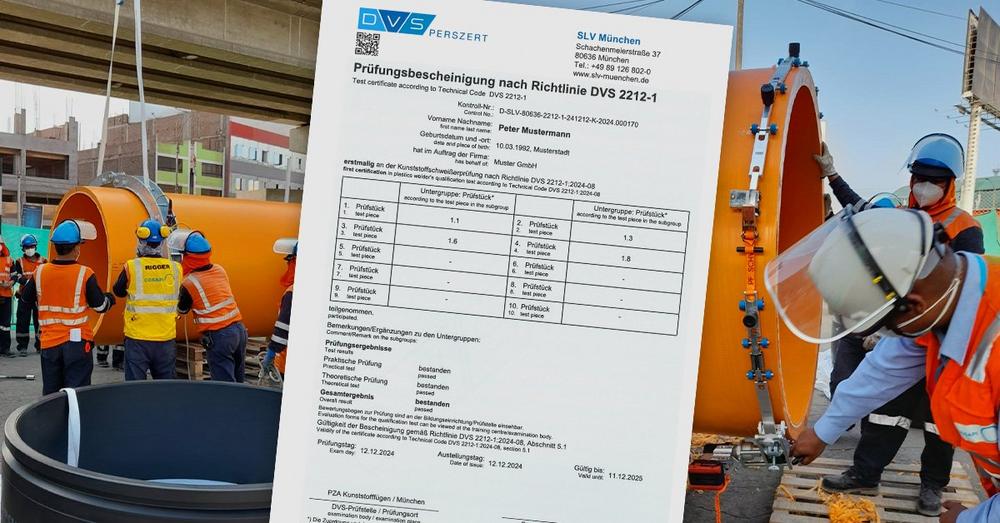Guideline DVS 2212-1:2024-08: “Testing of plastic welders for plant construction (apparatus, tank and pipeline construction)”

Breaking News:
Kathmandu Nepal
Mittwoch, Apr. 23, 2025

SLV MUNICH CLARIFIES.
The guideline contains the basic provisions and rules for the standardized implementation of plastic welder testing. The assessment of the knowledge and skills of plastic welders on the basis of objective criteria contributes to the quality assurance of plastic welded joints to ensure compliance with the high safety requirements for new production and repair.
The update of the regulations takes into account the experience gained in the meantime in order to ensure an optimized professionalization of the qualification of plastic welders and a sustainable increase in the quality of welding work. Chapter 9 “Appendix: Explanations, tables, images, annexes” contains, among other things, user-friendly information on the changes to the January 2024 edition.
AMENDMENTS
Scope and range of the audit
Test groups: The test groups have been divided into corresponding subgroups depending on the material, with new welding procedure combinations. For example, test group 1 can be used for welding PVC materials, test group 2 for PP materials, test group 3 for PE materials, etc.
Processes: The processes infrared welding (IR) and bead and groove-free welding (WNF) are now covered.
Dimension ranges: New dimensions have been introduced, especially for pipes, e.g. test group 2.6 PP HS R ≥1200 mm with a scope of I-seams > 150, > ø 1600.
Materials: A broader application of this test guideline in various industrial sectors is made possible by the inclusion of additional materials. Newly included are
♣ fluoropolymers – ethylene-chlorotrifluoroethylene (ECTFE), tetrafluoroethylene-hexafluoropropylene (FEP), perfluoroalkoxy copolymer (PFA) – as high-performance plastics;
♣ polyamides (PA) – polyamides plasticizer-free / polyamides unplasticized (PA-U) -.
The newly introduced test groups, procedures, dimensions and materials open up new testing options for plastic welders.
Evaluation of the production of the test pieces
Test method: In order to assess the quality of the test pieces, as many areas of influence as possible must be recorded during the production of the test pieces. The guideline takes into account the current state of the art. The tensile test, for example, is an option in certain test groups due to its low informative value and is no longer a requirement.
Occupational safety
Safety standards: With the introduction of the new materials, significantly higher occupational safety measures are required when processing fluoropolymers. The latest legal requirements and best practices must be taken into account.
YOUR TECHNICAL CONTACT IN THE FIELD OF PLASTIC JOINING
GSI – Gesellschaft für Schweißtechnik International mbH, SLV Munich branch is a recognized DVS training institution and examination location in the field of plastics due to its proven competence.
Interested parties can train as plastic welders in our basic courses in accordance with DVS 2281 and DVS 2282 in conjunction with DVS 2212-1. The processes of heated-tool butt welding, electrofusion welding, heated-tool socket welding, hot gas fanning, hot gas drawing, hot gas extrusion welding etc. are taught by means of practical exercises. Due to its versatility, this profession is in great demand in industries such as apparatus, plant, pipeline and biogas plant construction.
The test acceptance takes place in the system of DVS-PersZert as a certification body for persons accredited according to DIN EN ISO/IEC 17024. The test certificate in accordance with DVS 2212-1 is recognized in many European countries. Alternatively, our customers can also take an examination in accordance with DIN EN 13067.
For some time now, we have also been able to support customers in the field of welding of plastic sheeting in earthworks and hydraulic engineering with our technical expertise during the test acceptance according to DVS 2212-3. The regulations cover the hot gas extrusion (WE), hot gas overlap (WU) and hot wedge (HH) welding processes for geomembranes made of PE-HD, ECB and PVC-P.
Our portfolio also includes courses in the field of gas and water supply in accordance with DVGW worksheet GW 330. Recognition as a course center by the German Technical and Scientific Association for Gas and Water (DVGW) and the German Pipeline Construction Association (rbv) enables us to offer plastic welder training recognized by partner associations such as the Austrian Association for the Gas and Water Industry.
Interested parties are cordially invited to visit www.slv-muenchen.de to find out more about the wide range of services offered by GSI/SLV.
GSI mbH, SLV Munich branch – the largest institute for welding technology and related processes in the Free State of Bavaria for over 70 years and one of eight globally active branches of the GSI network – offers services in the field of welding, joining, spraying and testing technology and corrosion protection as a recognized training, monitoring and testing body. The portfolio ranges from the practical training and further training of specialists and managers to decision-making and action principles in quality assurance and innovative processes in materials technology.
SLV – Schweißtechnische Lehr- und Versuchsanstalten
Bismarckstrasse 85
47057 Duisburg
Telefon: +49 (203) 3781 – 132
Telefax: +49 (203) 3781-308
https://www.gsi-slv.de
![]()